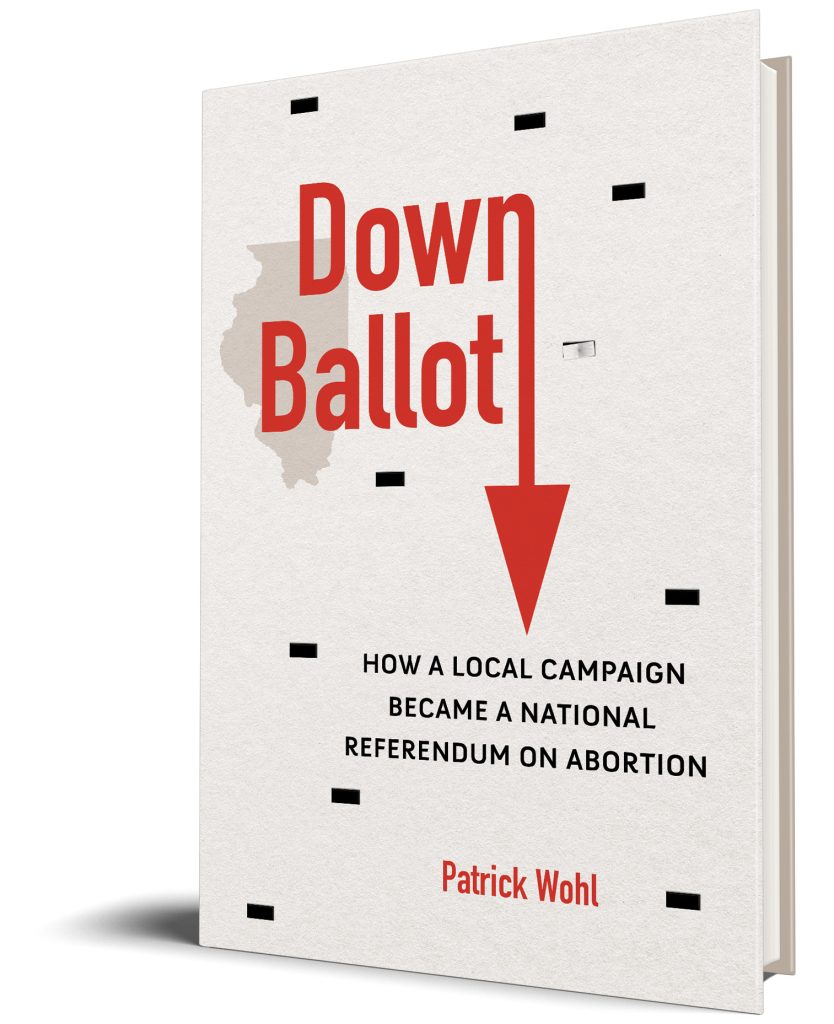Patrick Wohl, author of Down Ballot: How a Local Campaign Became a National Referendum on Abortion, answers questions on his new book.
Q: Why did you decide to write this book?
There are thousands of stories about presidential campaigns. Tales abound of contentious races for governor or Senate. Yet there are so few books about the campaigns that actually hit closest to home. With Down Ballot, I felt that the story of Rosemary Mulligan and Penny Pullen’s race for state representative provided an opportunity to show people that local politics is both engaging and important. You don’t have to live in Illinois to appreciate this book because their story is representative of the thousands of legislators that impact our daily lives in state capitals across the country. On nearly every difficult public policy question of our day, there is a Rosemary Mulligan or Penny Pullen advocating passionately for their side. I’ve tried with this book to evoke in readers a simple question: Do you know what’s happening down ballot?
Q: What is the most interesting discovery you made while researching and writing your book?
I was astounded by the amount of national attention this little race in the northwest suburbs of Chicago garnered in 1990. The Pullen-Mulligan race piqued the interest of politicos for what it said about the issue of abortion and again because of the recount. On abortion, the Illinois 1990 primary was one of the first elections held after the Supreme Court’s 1989 Webster v. Reproductive Health Services decision which allowed states more leeway in regulating abortion. Viewing it as a proxy war on the larger national issue, pro-choice groups bolstered Rosemary Mulligan and pro-life groups supported incumbent Penny Pullen. After the race was declared a tie, it was again thrust into the state and national spotlight when at one point it was decided by a coin toss and eventually reached the Illinois Supreme Court over the issue of whether or not to count so-called “dimpled chads.” Simply put, this was not your average state legislative race.
Q: What myths do you hope your book will dispel or what do you hope your book will help readers unlearn?
That local politics is boring or unimportant. Today, the most important issues being debated in our country are decided in state capitals, not in Washington. The average state legislator in a leadership position or committee chairmanship has more power and influence on our lives than a run-of-the-mill member of Congress. The difference? State leaders mostly fly under the radar. Americans need to understand that local politics—whether at the municipal, county, or state level—is arguably more consequential than the national political battles capturing our attention.
Q: Which part of the publishing process did you find the most interesting?
As mind-numbing as it sounds, I found the process of obtaining the rights to various photos enlightening. Before I’d written a book, I think my view toward attribution of ownership and crediting artists/photographers/authors was much like the average person (Do I really have to do this?!). Now I see how paramount it is to respect the intellectual property that others create. Without that respect, there is little incentive for people to keep creating new things.
Q: What is your advice to scholars/authors who want to take on a similar project?
Don’t tell anyone you’re writing a book. Keep it a secret. Do your research, conduct your interviews, and try to see if there’s enough there to show you have proof of concept. The best ideas die in their infancy, and all it takes when you’re starting out is one negative comment or apathetic reaction to your idea for you to give up prematurely. Nearly everyone has an idea for a book, product, or business, but very few people end up following through. I think that tendency to let others get you down right out of the gate is part of that reason why that’s true.

Patrick Wohl is a former campaign staffer on races for president, governor, state senate, and state representative, and on ballot initiatives across the country.

